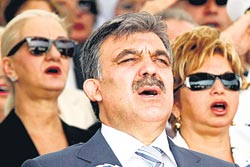
Turkey's transformation and secularismAbdullah Gül's election as Turkey's 11th president marks a watershed in the country's history. In July, the ruling Justice and Development Party (AKP) - religiously conservative but economically liberal - won a landslide in parliamentary elections called after the military balked at seeing Gül become president. That victory, combined with Gül's election, confirm the AKP's emergence as a party of realignment, and that, despite an upsurge of xenophobic nationalism, Turks wanted to integrate with the European Union. Last April, Gül's candidacy brought a threat of a coup from the military, precipitating the recent elections. Thus, the electorate also made it clear that it no longer wanted the military involved in domestic politics, rejecting the generals' warnings that the AKP would lead the country into the darkness of theocratic rule.
The fierce debate concerning the presidency underscored the symbolic significance of the post in Turkey's domestic balance of power. The headscarf that Gül's wife wears for religious reasons was seen as an assault on Turkey's sacrosanct principle of secularism. Indeed, outgoing President Ahmet Necdet Sezer refused to invite the wives of AKP deputies who covered their hair to state dinners and Republic Day receptions. The president obviously represents the state, but he is not a mere figurehead. After all, he sits in Ataturk's chair. He has wide-ranging powers, including the authority to make senior government appointments. He appoints judges to high courts and members to the Higher Educational Council (YOK). He selects the presidents of state universities from a list submitted by the YOK. In times of peace, he is the commander-in-chief of the armed forces. This is why the crisis over the presidential election was actually a crisis of the constitutional order installed by the military when it ruled from 1980-1983. That constitution - unlike Ataturk's - was written by and for the military on the assumption that the Cold War would never end, and that the president would always be either a military person or someone close to the military. But the Cold War is long over, and a lot has since changed in Turkey. An IMF-supported program in 2001 unleashed rapid economic growth, based on Turkey's gradual but definitive transformation into a market economy. At the same time, Turkey moved decisively onto the path of political and administrative reform in order to start EU accession negotiations. Moreover, Turkey's economic and social transformation brought forth a new elite. The AKP came to represent this new elite and its quest for political power. Many foreign commentators described the presidential and parliamentary elections as a contest between Turkey's secular past and a putative Islamist future. However, the contest is more accurately seen as one between an open and an introverted Turkey; between civilian, democratic rule and military tutelage; and between a globalizing and a protectionist economy. The AKP's support came from both the winners and losers of globalization, from conservative middle Anatolia and cosmopolitan Istanbul, from the nationalist Black Sea region and the predominantly Kurdish Southeast. Following the AKP's parliamentary election victory in July, and now with the election of Gül, many observers predicted military intervention. Although there is no doubt that the military, as the bastion of the secular establishment, does not like these results, a coup is virtually out of the question. One reason is that relations between the military and the Islamist movement are more complicated than they appear. Back in 1997, when the military pushed the then Islamist-led government of Necmettin Erbakan out of power, the Islamist movement fractured. The younger, more modern, and outward-looking elements broke away from the traditional, anti-western, anti-Semitic older generation. This year's crisis led Recep Tayyip Erdogan, the prime minister, to complete the transformation of the AKP away from doctrinaire Islamism. Following the AKP's victory in July, Erdogan initially sought to avoid antagonizing the military by not renewing Gül's presidential candidacy. Yet Gül insisted, and the AKP united behind him. As a result, Turkey is entering uncharted waters. Gül will be an engaged president. As Turkey faces many regional challenges, his experience as foreign minister ought to serve him well. But an engaged and active president may cause tension with the prime minister who, in the Turkish system, is the real chief executive. Gül's ascent to the presidency should consolidate the transformation of Turkish politics. Turkey has integrated its Islamist movement into the political mainstream. Representatives of an economically dynamic and socially conservative heartland are moving Turkey toward reform. The republican project of modernization will continue, with a wider mobilization of society. Thus, Turkey will continue its unprecedented amalgam of Islam, capitalism, and secular liberal democracy. As unlikely as it may seem in the wake of the crisis over Gül's candidacy, so far Turkey is managing this challenge well. (Soli Ozel teaches in Bilgi University's Department of International Relations and is a columnist for the Turkish daily Sabah.) Copyright: Project Syndicate, 2007. Exclusive to The Sunday Times |
|| Front
Page | News | Editorial | Columns | Sports | Plus | Financial
Times | International | Mirror | TV
Times | Funday
Times || |
| |
Copyright
2007 Wijeya
Newspapers Ltd.Colombo. Sri Lanka. |
